- Why Do Tea Stains Stick to Composite Sinks?
- What You'll Need – DIY Tea Stain Removal Kit
- What are the Step-by-Step Guide on How I Remove Tea Stains from Composite Sink?
- Tried and Tested DIY Methods That Worked for Me
- What If the Stain Still Won't Budge?
- How Do I Keep My Composite Sink Tea-Stain Free?
- Final Thoughts – My Go-To Tea Stain Removal Strategy
- FAQs – Common Questions I’ve Been Asked On How to Remove Tea Stains from Composite Sink
Tea stains in a composite sink are more than just a visual nuisance—they can make your otherwise clean kitchen feel dirty.
I’ve dealt with this enough times in my own home to know how frustrating it can be. But don’t worry, I’ve learned a few reliable tricks to tackle even the most stubborn marks.
In this guide, I’ll walk you through how to remove tea stains from composite sink using simple, safe and effective DIY methods.
Why Do Tea Stains Stick to Composite Sinks?
What are composite sinks made of?
Composite sinks are typically made from a mix of granite or quartz particles and resin binders, giving them durability and a stylish stone-like appearance.
However, their slightly porous surface can sometimes trap liquids and pigments—like tannins from tea.
Why does tea stain easily?
Tea contains natural tannins, which are plant-based compounds that cause discoloration.
These bind to surfaces easily, especially when left to dry or when the sink hasn’t been properly rinsed after use.
Are composite sinks more prone to staining?
Yes and no. While composite sinks are tough, they’re also more absorbent than stainless steel, meaning stains—especially from tea, coffee, and tomato sauces—can settle in more easily if not cleaned promptly.
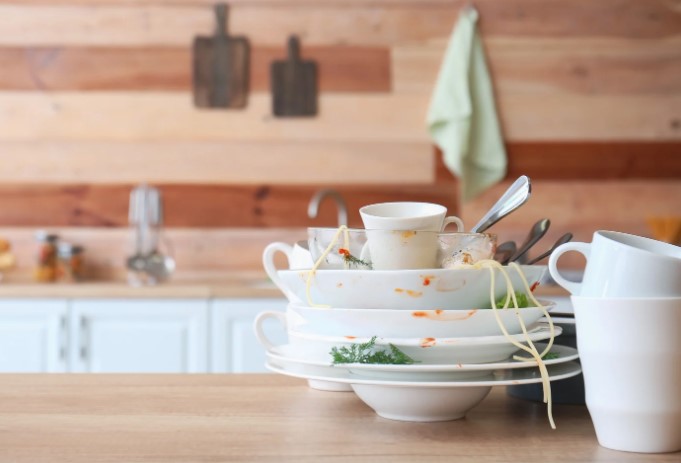
What You’ll Need – DIY Tea Stain Removal Kit
Before we jump into the process, here’s what I always keep handy when tackling stains in my kitchen sink.
Must-have cleaning materials
- Baking soda
- White vinegar
- Lemon juice
- Table salt
- Non-abrasive sponge or cloth
- Mild dish soap
- Hydrogen peroxide (for tough stains)
- Gloves (optional)
Natural vs chemical cleaners
You can go with either eco-friendly natural cleaners or commercial options. Here’s a quick comparison:
| Cleaner Type | Pros | Cons |
| Baking Soda & Vinegar | Natural, safe, low cost | May take multiple applications |
| Lemon & Salt | Refreshing scent, mildly abrasive | Less effective on deep stains |
| Commercial Cleaners | Fast and powerful | May damage surface if too strong |
| Hydrogen Peroxide | Great for deep stains | Should be used cautiously |
What are the Step-by-Step Guide on How I Remove Tea Stains from Composite Sink?
When I first noticed tea stains in my white granite composite sink, I tried a few things that didn’t work. After some trial and error, here’s the method I swear by:
Step 1: Rinse and wipe the surface
Start by giving the sink a good rinse with warm water to loosen any residue. Then clean it down with a sponge & a few drops of mild dish soap.
Step 2: Apply baking soda and vinegar
Sprinkle an abundance of baking soda over the stained area. Pour white vinegar over the top and let the fizzing magic happen. This chemical reaction helps break down the tea stains naturally.
Step 3: Scrub gently with a non-abrasive sponge
Use a soft sponge in a circular motion. Avoid steel wool or anything too rough—composite sinks scratch easily.
Step 4: Rinse thoroughly and repeat if needed
Rinse with warm water. If the stain persists, repeat the process once or twice more.
Tip: For really stubborn stains, I leave the baking soda and vinegar mixture on the sink for 15–20 minutes before scrubbing.
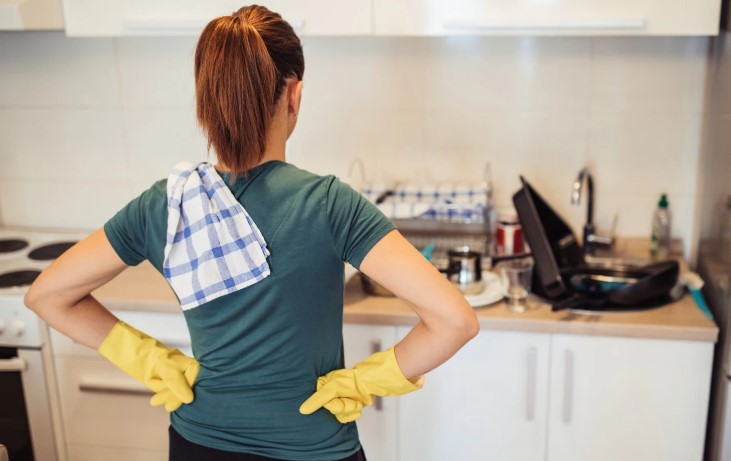
Tried and Tested DIY Methods That Worked for Me
Using lemon and salt for light stains
Squeeze fresh lemon juice directly onto the stained area and sprinkle salt over it. Let it sit for 10–15 minutes before scrubbing and rinsing. It’s perfect for daily touch-ups.
Hydrogen peroxide paste for stubborn stains
Blend hydrogen peroxide and baking soda to form a paste. Put it over the stain and let it stay for 30 minutes. This trick helped me remove a week-old tea stain that nothing else could touch.
Comparison of DIY methods
| Method | Effectiveness | Best For | Caution Needed? |
| Baking Soda & Vinegar | ★★★★☆ | Most stains | No |
| Lemon & Salt | ★★★☆☆ | Light stains | No |
| Hydrogen Peroxide Paste | ★★★★★ | Old or tough stains | Yes |
What If the Stain Still Won’t Budge?
Sometimes, the basic methods may not be enough. Here’s what I do next:
When to try a mild abrasive cleaner?
If natural remedies fail, try a composite-safe abrasive cleaner such as Bar Keepers Friend. Use it sparingly and follow the command carefully.
How to use a commercial cleaner without damaging the sink?
Always test on a small corner first. Avoid bleach, as it can discolour or weaken the sink surface.
Top UK-safe cleaning products I’ve used:
- Astonish Paste – gentle but effective
- Method Daily Granite Spray – for maintenance
- Ecover Cream Cleaner – eco-friendly and safe
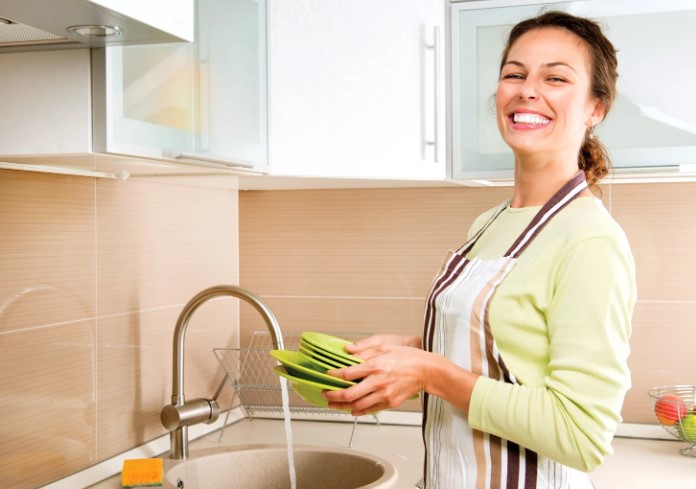
How Do I Keep My Composite Sink Tea-Stain Free?
I’ve learned that preventing stains is easier than removing them.
Daily cleaning tips and sink care
Wipe the sink dry after each use, and avoid letting tea or coffee sit in the basin for long.
Things I avoid to protect the composite surface:
- Leaving tea bags or mugs in the sink
- Using harsh bleach-based cleaners
- Scrubbing with steel wool
- Letting water pool overnight
Weekly deep cleaning routine
Once a week, I sprinkle baking soda across the sink, spray with vinegar, let it fizz for 5–10 minutes, and scrub it down. It keeps the surface fresh and stain-free.
Final Thoughts – My Go-To Tea Stain Removal Strategy
Removing tea stains from a composite sink doesn’t have to be a headache. My best advice? Act quickly, use gentle cleaners, and clean regularly.
The baking soda and vinegar method has become my go-to, and it’s saved me from needing costly sink replacements.
Whether you prefer all-natural solutions or safe commercial cleaners, there’s a method mentioned out on how to remove tea stains from composite sink there that’ll keep your sink looking like new. Happy cleaning!
Related Article: How To Remove Smell From Kitchen Sink?
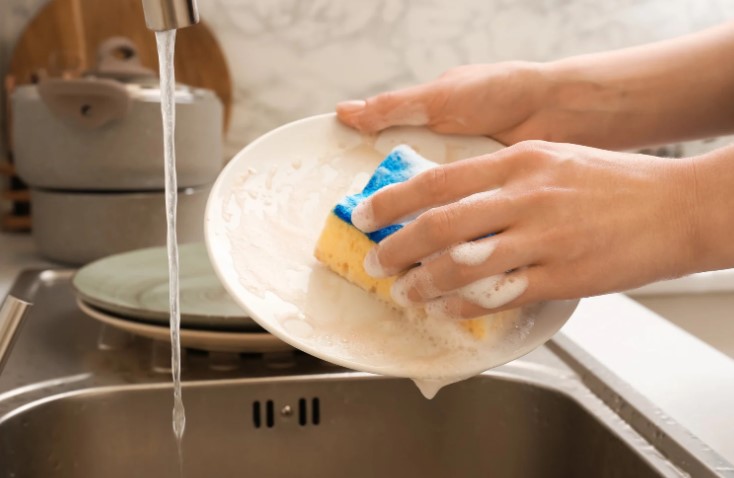
FAQs – Common Questions I’ve Been Asked On How to Remove Tea Stains from Composite Sink
1. Can bleach be used on a composite sink?
I strongly recommend avoiding bleach. It may seem effective but can damage the resin in the sink and lead to dull spots or fading.
2. Is tea the only thing that causes discoloration?
Not at all. Coffee, red wine, tomato sauces, and even hard water can lead to discolouration if left untreated.
3. Will these methods work on coloured composite sinks?
Yes! Just make sure to test any cleaner (especially hydrogen peroxide) on a small area first, as some coloured sinks can react differently.

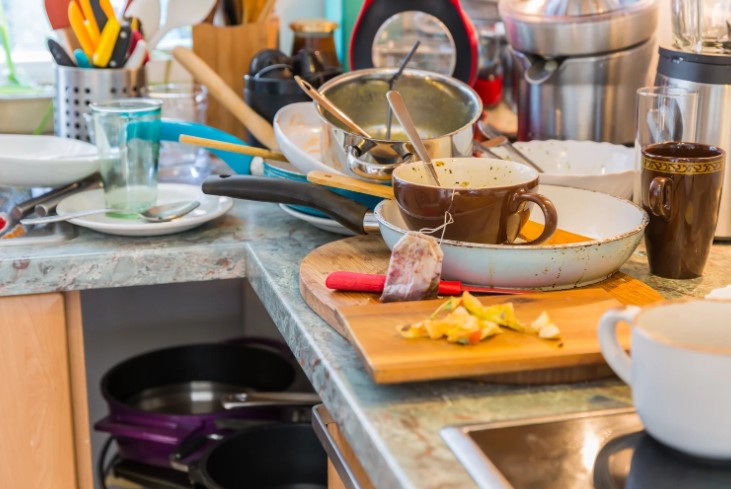
0 Comments